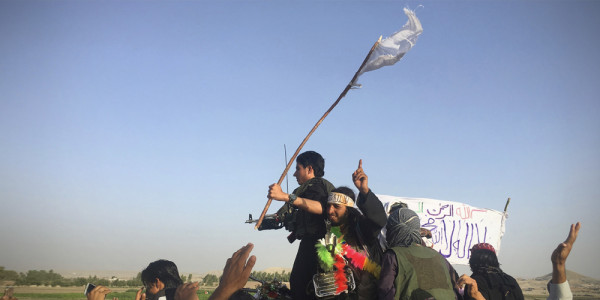

At the moment, it is not clear if the Taliban have agreed to stop attacking Afghan troops and police under an agreement with the United States.
Signed on Feb. 29, the agreement calls for all U.S. and coalition troops to leave Afghanistan over the next 14 months if the Taliban refuse to allow Al Qaeda to use the country as a staging base to launch terrorist attacks.
Nowhere in the four-page agreement does the Taliban pledge to continue the reduction in violence that led up to Feb. 29, yet Defense Secretary Mark Esper has said the U.S. military is allowed to continue to support Afghan security forces if they come under attack.
On Wednesday, a U.S. airstrike targeted Taliban fighters who were attacking an Afghan government checkpoint.
“As I recall, the agreement says that once signed we would continue a reduction in violence that would continue downward and as part of the intra-Afghan negotiations we would move to a comprehensive ceasefire across the country,” Esper said at a Pentagon news conference on Thursday. “That’s what we’re committed to implementing.”
“At the same time: Part of the agreement states that we always have the right of self-defense and to defend our Afghan partners, which we’ve done in the past couple days, and we’ll continue to do,” Esper continued.
When Task & Purpose pointed out that the words “reduction in violence” do not appear in the withdrawal agreement itself, Esper suggested that perhaps the Taliban had agreed to refrain from attacking Afghan security forces in documents that have yet to be publicized.
“I’d have to look through it again,” Esper said. “There are also two implementing arrangements that are not available to the public that address things such as the Taliban’s counterterrorism commitments and the withdrawal of forces. It may be in there. I don’t have a photographic memory when it comes to agreements like that.”

“I know there’s the base agreement and some annexes,” Esper told Rep. Liz Cheney (R-Wyo.) during a Feb. 26 House Armed Services Committee hearing. “I don’t know if those have been agreed upon as secret or something but I will certainly raise that with the secretary of state.”
Gen. Austin Miller, the top U.S. military commander in Afghanistan, issued a statement on Monday saying the United States expects the Taliban to keep the level of violence in the country low per its agreement.
But if the Taliban have secretly agreed to not attack Afghan security forces, they have failed to do so. Milley conceded on Wednesday that the Taliban had attacked several Afghan government outposts in the past 48 hours.
Whatever U.S. government officials might say, the Taliban has consistently said it would continue to fight Afghan government forces after striking a withdrawal agreement with the United States, said Bill Roggio, a senior fellow with the Foundation for Defense of Democracies think tank in Washington, D.C.
“If the U.S. wanted to ensure that the Taliban halted attacks after it inked a deal with the Taliban, then a ceasefire should have been a requirement of the deal,” Roggio told Task & Purpose on Thursday. “It wasn’t, and so the Taliban is correct in saying that it has the right to resume attacks against Afghan forces.”
